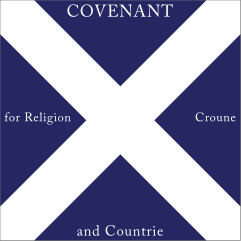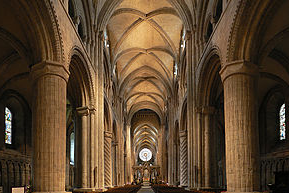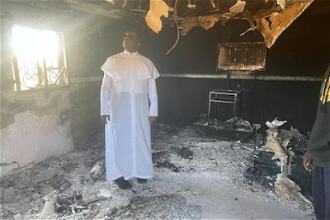Remains of 17C Scottish soldiers imprisoned in Durham Cathedral found in mass graves

Flag captured at Dunbar
New light has been shed on a centuries-old mystery surrounding the last resting place of thousands of Scottish soldiers who died after being captured and imprisoned in Durham Cathedral and Castle during the 17th Century civil wars. Archaeologists at Durham University carried out scientific analysis on skeletons discovered in two mass graves on Durham's UNESCO World Heritage Site in November 2013. Combining this data with information from the excavation and historical records, the researchers concluded that 'the only plausible' explanation was that the skeletons were those of Scottish soldiers captured by English forces following the Battle of Dunbar in September 1650 and taken to Durham on the orders of Oliver Cromwell.
The battle left anywhere between 300 and 5,000 dead. Modern calculations suggest that an estimated 6,000 Scottish soldiers were taken prisoner with about 1,000 of those who were sick and wounded then released to go home. About 1,000 of the men are believed to have died en route to Durham from a combination of hunger, exhaustion and gastric problems - probably dysentery. Others were executed, while some escaped.
Around 3,000 Scottish soldiers in total were then imprisoned in Durham Cathedral and Castle, at a time when the Cathedral was empty and abandoned, its Dean and Chapter having been evicted and worship suppressed by order of Oliver Cromwell, as was the case with all English Cathedrals at that time.
An estimated 1,700 prisoners from the battle died and were buried in Durham and experts say that there are potentially many more burials nearby.
Richard Annis, senior archaeologist, Archaeological Services Durham University, said: "This is an extremely significant find, particularly because it sheds new light on a 365-year old mystery of what happened to the bodies of the soldiers who died.
"Their burial was a military operation: the dead bodies were tipped into two pits, possibly over a period of days. They were at the far end of what would have been the Durham Castle grounds, as far as possible from the Castle itself - they were out of sight, out of mind.
"It is quite possible that there are more mass graves under what are now University buildings that would have been open ground in the early to mid-17th Century."
The Durham University team, with Durham Cathedral, will be working with partners and interested parties to determine what will happen to the remains of the Scottish soldiers, and an appropriate commemoration.
These discussions are likely to include the Church of Scotland, since the prisoners would have been predominantly Scottish Presbyterians.
Remembrance prayers will be said at Durham Cathedral on Thursday, September 3, the anniversary of the Battle of Dunbar.
Canon Rosalind Brown, of Durham Cathedral, said: "There is a plaque at Durham Cathedral in commemoration of the Scottish soldiers, which was dedicated in November 2011 on St Andrew's Day. The discovery of the bodies and the conclusion that they are some of the Scottish soldiers is of great significance.
"The Cathedral will work closely with all interested parties to determine the most appropriate course of action for the burial of the soldiers in a manner appropriate to their Christian tradition. We are particularly mindful of descendants of the Scottish soldiers and hope and pray that this new information can bring solace."
For more information see: www.dur.ac.uk/archaeology/research/projects/europe/pg-skeletons/find/



















